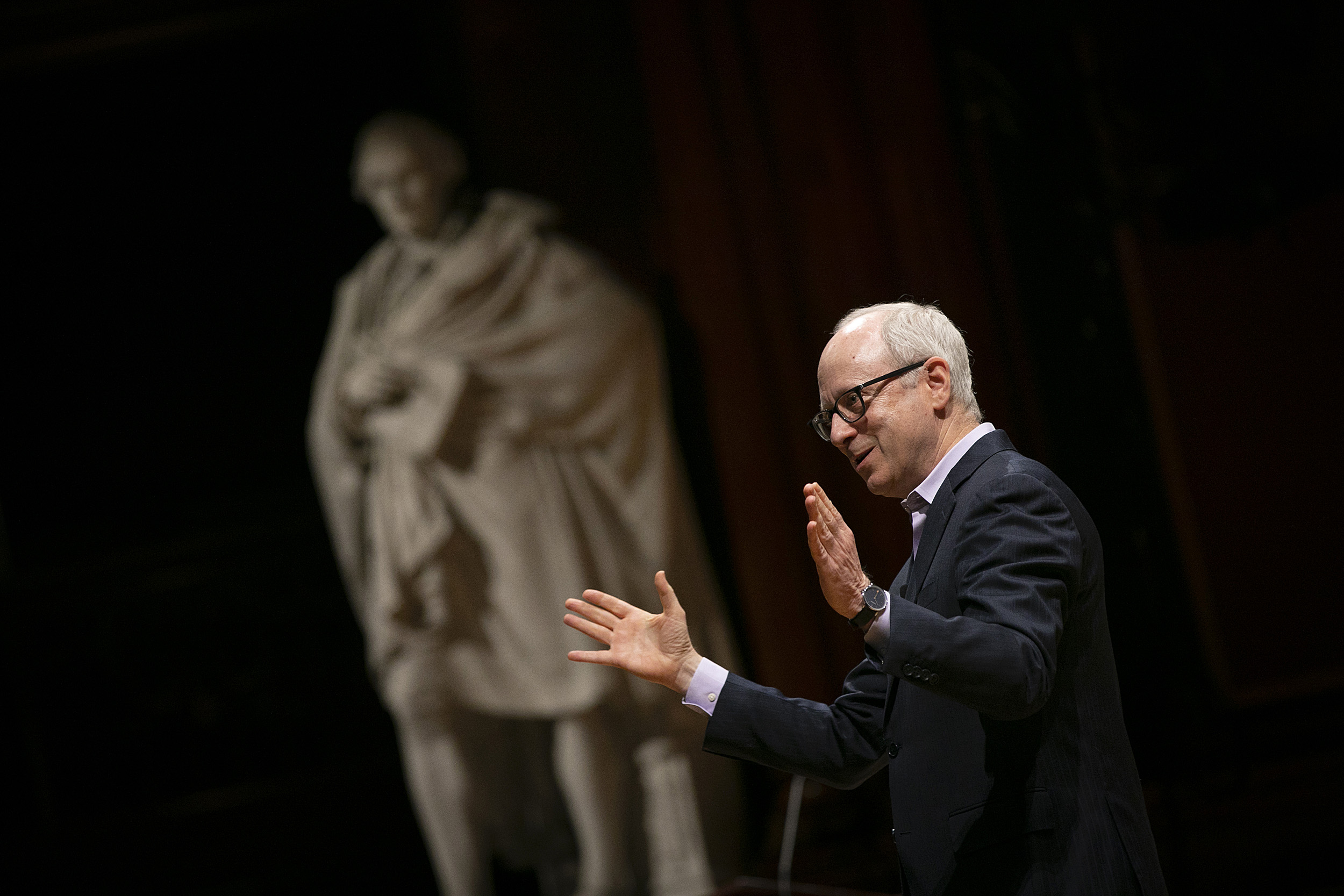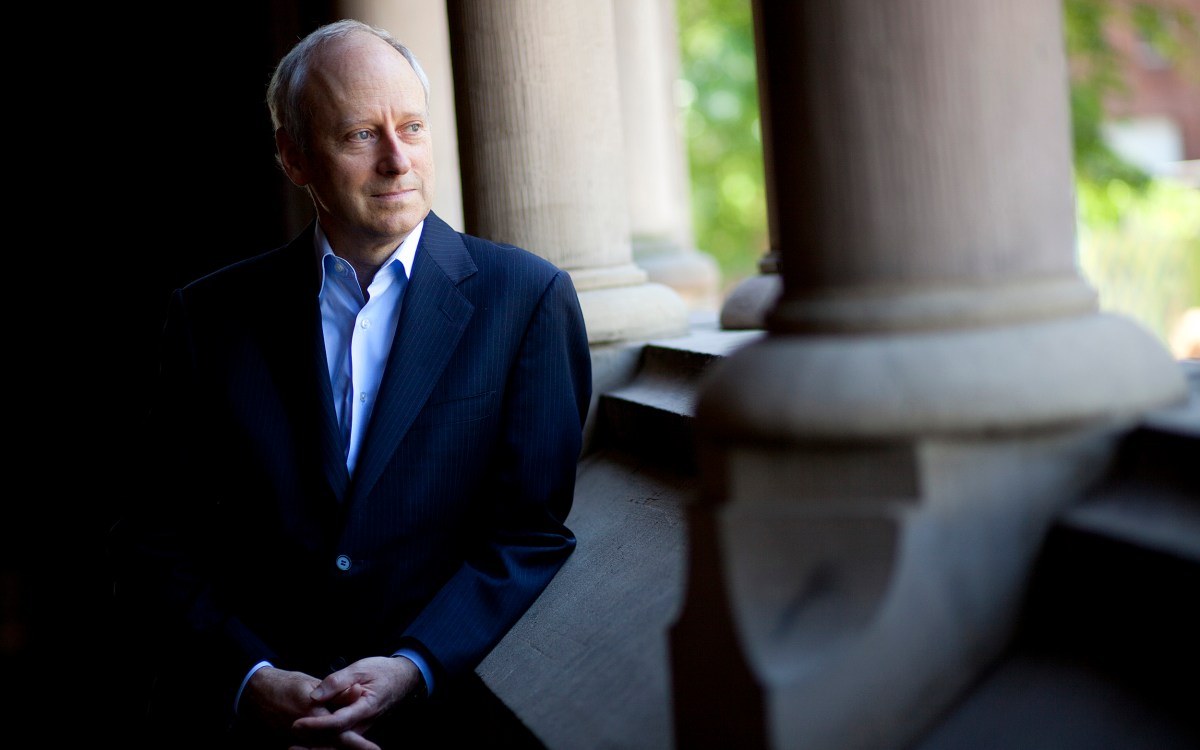Toppling the myth of meritocracy

Michael Sandel speaks in the Sanders Theatre during a 2018 event.
Stephanie Mitchell/Harvard file photo
Not merely self-deluding, Michael Sandel argues in excerpt from new book, it also fuels our divisiveness
Excerpted from “Tyranny of Merit: What’s Become of the Common Good?” by Michael J. Sandel (Farrar, Straus and Giroux)
In March 2019, as high school students awaited the results of their college applications, federal prosecutors made a stunning announcement. They charged 33 wealthy parents with engaging in an elaborate cheating scheme to get their children admitted to elite universities including Yale, Stanford, Georgetown, and the University of Southern California.
At the heart of the scam was an unscrupulous consultant named William Singer, who ran a business that catered to anxious, affluent parents. Singer’s company specialized in gaming the intensely competitive college admissions system that had in recent decades become the primary gateway to prosperity and prestige. For students lacking the stellar academic credentials top colleges required, Singer devised corrupt workarounds.
For instance, the chairman of a prestigious law firm paid $75,000 for his daughter to take a college entrance exam at a test center supervised by a proctor paid by Singer to ensure the student received the score she needed. Television actress Lori Loughlin and her husband, fashion designer Mossimo Giannulli, paid Singer $500,000 to get their two daughters admitted to USC as bogus recruits to the crew team. Another celebrity, the actress Felicity Huffman, known for her role in the television series “Desperate Housewives,” somehow got a bargain rate; for only $15,000, Singer put in the fix for her daughter’s SAT. In all, Singer took in $25 million over eight years.
The scandal provoked universal outrage. In a polarized time, when Americans could scarcely agree on anything, it drew massive coverage and condemnation across the political spectrum — on Fox News and MSNBC, in The Wall Street Journal and The New York Times. Everyone agreed that bribing and cheating to gain admission to elite colleges was reprehensible. But the outrage expressed something deeper. In ways that people struggled to articulate, it was an emblematic scandal, one that raised larger questions about who gets ahead, and why.
In describing his scam, Singer noted that some try to ensure entrance for marginally qualified applicants through the “back door,” giving a college a major gift. But he noted that strategy offered no guarantee of admission. He referred to his own technique of bribes and faked test scores as a surer “side door” approach.
From the standpoint of fairness, however, it is hard to distinguish between the “back door” and the “side door.” Both give an edge to children of wealthy parents who are admitted instead of better-qualified applicants. Both allow money to override merit. Admission based on merit defines entry through the “front door.” As Singer put it, the front door “means you get in on your own.” It represents what most people consider fair.
In practice, of course, it is not that simple. Money hovers over the front door as well as the back. Measures of merit are hard to disentangle from economic advantage. Standardized tests such as the SAT purport to measure merit. In practice, however, SAT scores closely track family income. The richer a student’s family, the higher the score he or she is likely to receive.
Not only do wealthy parents enroll their children in SAT prep courses, they hire private admissions counselors to burnish their applications, enroll them in dance and music lessons, train them in elite sports such as fencing, squash, golf, tennis, crew, lacrosse, and sailing, the better to qualify for recruitment to college teams, and send them off to perform good works in distant places to demonstrate concern for the downtrodden. And don’t forget the potential benefits of legacy admission and donor appreciation.
Then there is tuition. At all but the handful of colleges wealthy enough to admit students without regard for their ability to pay, those who do not need financial aid are more likely than their needy counterparts to get in.
Critics point to these inequalities as evidence that higher education is not the meritocracy it claims to be. From this point of view, the admissions scandal is an egregious instance of the broader, pervasive unfairness that prevents higher education from living up to the meritocratic principle it professes.
Despite their disagreements, those who consider the cheating scandal a shocking departure from standard admissions practices and those who consider it an extreme example of tendencies already prevalent in college admissions share a common premise: Students should be admitted to college based on merit. They also agree, implicitly at least, that those who get in based on merit have earned their admission and deserve the benefits that flow from it.
If this familiar view is right, then the problem with meritocracy is not with the principle but with our failure to live up to it. Political argument between conservatives and liberals bears this out. Our public debates are not about meritocracy itself but about how to achieve it. Conservatives argue, for example, that affirmative action policies that consider race and ethnicity as factors in admission amount to a betrayal of merit-based admission; liberals defend affirmative action as a way of remedying persisting unfairness and argue that a true meritocracy can be achieved only by leveling the playing field between the privileged and the disadvantaged.
But this debate overlooks the possibility that the problem with meritocracy runs deeper.
Consider again the admissions scandal. Most of the outrage focused on the cheating and the unfairness. Equally troubling, however, are the attitudes that fueled the cheating. Lying in the background was the assumption, now so familiar that it is scarcely noticed, that admission to an elite university is a highly sought prize. The scandal was attention-grabbing not only because it implicated celebrities and the wealthy but also because the access they tried to buy was so widely and ardently desired.
Why is this so? Why has admission to prestigious universities become so fiercely sought that privileged parents commit fraud to get their kids in? Or turn their high school years into a stress-strewn gantlet of AP classes, résumé building, and pressure-packed striving? Why has admission to elite colleges come to loom so large in our society that the FBI would devote massive law enforcement resources to ferreting out the scam, and that news of the scandal would command headlines and public attention for months?
The obsession has its origins in the growing inequality of recent decades. It reflects the fact that more is at stake in who gets in where. As the wealthiest 10 percent pulled away from the rest, the stakes of attending a prestigious college increased. Fifty years ago, applying to college was less fraught. Fewer than one in five Americans went to a four-year college, and those who did tended to enroll in places close to home. College rankings mattered less than they do today.
But economic anxiety is not the whole story. More than a hedge against downward mobility, Singer’s clients were buying something else, something less tangible but more valuable. They were, in fact, buying the borrowed luster of merit. In an unequal society, those who land on top want to believe their success is morally justified. In a meritocratic society, this means the winners must believe they have earned their success through their talent and hard work.
“As the meritocracy intensifies, the striving so absorbs us that our indebtedness recedes from view. In this way, even a fair meritocracy, one without cheating or bribery or special privileges for the wealthy, induces the mistaken impression that we have made it on our own.”
Paradoxically, this is the gift the cheating parents wanted to give their kids. If all they really cared about was enabling their children to live in affluence, they could have given them trust funds. But they wanted something else — the meritocratic cachet that admission to elite colleges confers, one that is itself illusory.
As we discussed, it cannot really be said that even students who win admission through the front door did so solely on their own. What about the parents and teachers who helped them on their way? What about talents and gifts not wholly of their making? What about the good fortune to live in a society that cultivates and rewards the talents they happen to have?
Those who prevail in a competitive meritocracy are indebted in ways the competition obscures. As the meritocracy intensifies, the striving so absorbs us that our indebtedness recedes from view. In this way, even a fair meritocracy, one without cheating or bribery or special privileges for the wealthy, induces the mistaken impression that we have made it on our own.
Besides being self-deluding, such thinking is also corrosive of civic sensibilities. For the more we think of ourselves as self-made and self-sufficient, the harder it is to learn gratitude and humility. And without these sentiments, it is hard to care for the common good.
College admission is not the only occasion for arguments about merit.
Debates about who deserves what abound in contemporary politics. On the surface, these debates are about fairness: Does everyone have a truly equal opportunity to compete for desirable goods and social positions?
But our disagreements about merit are not only about fairness. They are also about how we define success and failure, winning and losing — and about the attitudes the winners should hold toward those less successful than themselves. These are highly charged questions, and we try to avoid them until they force themselves upon us.
Finding our way beyond the polarized politics of our time requires a reckoning with merit. How has its meaning been recast in recent decades, in ways that erode the dignity of work and leave many people feeling that elites look down on them? Are the winners of globalization justified in the belief that they have earned and therefore deserve their success, or is this a matter of meritocratic hubris?
At a time when anger against elites has brought democracy to the brink, the question of merit takes on a special urgency. We need to ask whether the solution to our fractious politics is to live more faithfully by the principle of merit, or to seek a common good beyond the sorting and the striving.
Copyright © 2020 by Michael J. Sandel. All rights reserved.







